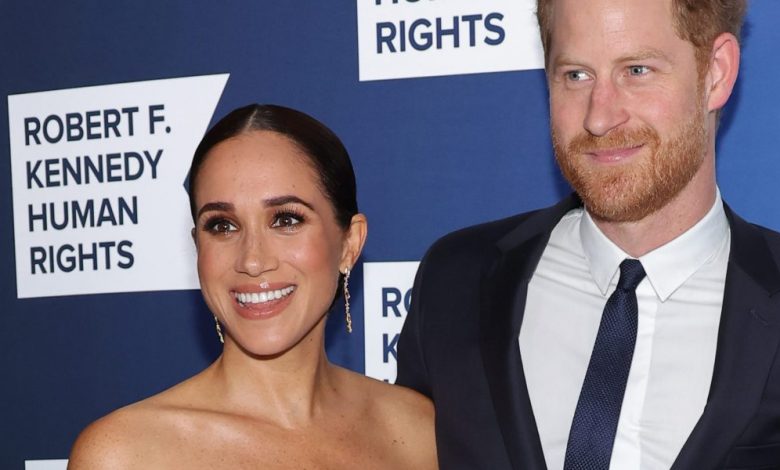Harry & Meghan Volume 2 Boosts Criticism of Royal Family in Netflix Documentary

Prince Harry and his wife Meghan vented their grievances against the British monarchy in the second half of their Netflix documentary series on Thursday, with Harry describing the royal press machinery – including leaking and planting stories in newspapers – as “dirty play”.
Harry, 38, also said a “wedge” had arisen between him and his older brother and heir apparent, Prince William, around the time Harry and Meghan decided to step back from royal duties and move away from the UK to a new life.
He cited the example of a joint statement that palace officials issued on his behalf and William to “squash” a story in which William had bullied the couple from family. He said it was issued without his consent.
“I could not believe it. No one had asked my permission to put my name under such a statement,” Harry told the Netflix series. “They happily lied to protect my brother, and yet for three years they were never willing to tell the truth to protect us.”
Elsewhere in the series, Meghan and Harry both repeated their complaints that British royal officials had failed to help them by dismissing inaccurate, negative reports about them.
“What clicked in my head was, ‘It’s never going to stop,'” Meghan said. “Every rumour, every negative thing, every lie and everything I knew was not true and that the palace knew it was not true and that they internally knew it was not true was admitted.”
Harry added: “At that point there was no other option. I said we have to get out of here.”
Meghan’s lawyer, Jenny Afia, claimed on the show that she saw evidence of “negative briefings from the Palace” against the couple “to suit other people’s agendas”. She did not explain what evidence she saw.
Palace officials have not commented on the series.
The first three episodes of Harry & Meghan, released last week, focused on the UK media’s coverage of the couple and the way they have been influenced by racism.
The new episodes come at a pivotal moment for the monarchy as King Charles III attempts to show that the institution is alive and well following the death of Queen Elizabeth II, whose personal popularity has muted criticism of the Crown throughout her 70-year reign remains alive. Charles argues that the House of Windsor can help unite an increasingly diverse nation by meeting face-to-face with representatives of the ethnic groups and faiths that make up modern Britain – and seeks to show that reality is independent of the allegations against him is different.
Harry’s 2018 marriage to former Meghan Markle, a multiracial American actress, was once seen as a public relations coup for the royal family, boosting the monarchy’s efforts to move into the 21st century by making it more representative of a multicultural nation became. But the fairy tale, which was punctuated with a horse-drawn carriage ride and a lavish wedding at Windsor Castle, soon unraveled amid relentless media attention, including claims Meghan was self-centered and bullied her staff.
“I wasn’t thrown to the wolves, I was fed to the wolves,” Meghan said.
The series is Harry and Meghan’s latest attempt at telling their own story after the couple retired from royal life in early 2020 and moved to the affluent Southern California enclave of Montecito. Her life on an estate overlooking the Pacific Ocean was funded in part by lucrative deals with Netflix and Spotify.
Race became a key issue for the monarchy after Harry and Meghan’s interview with Oprah Winfrey in March 2021. Meghan claimed that ahead of the birth of her first child, a member of the royal family commented on how dark the baby’s skin could be.
Prince William defended the royal family after the interview, telling reporters: “We are not a racist family.”
Buckingham Palace faced renewed accusations of racism earlier this month when a black advocate for domestic violence survivors said a senior member of the royal household questioned her about her origins during a reception at the palace. Coverage of the issue filled the UK media and cast a shadow over William and his wife Kate’s much-anticipated visit to Boston, which the palace had hoped would highlight their environmental credentials.
The Netflix series is problematic for the palace because Harry and Meghan are targeting the same younger, more culturally diverse demographic that William and Kate are trying to attract, said Pauline Maclaran, author of Royal Fever: The British Monarchy in Consumer Culture. ”
“I think the royal family has to worry about their future because they really need to get this young generation on their side to some extent if they want to survive,” she said. “You’re going to have to work really hard to appear more diverse and I think we’re seeing that happen a little bit, but not enough.”
Our new weekly Impact Report newsletter explores how ESG news and trends are shaping the roles and responsibilities of today’s leaders. Subscribe here.



